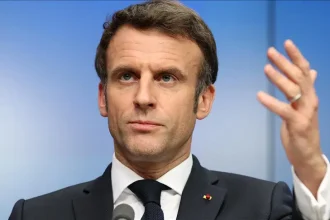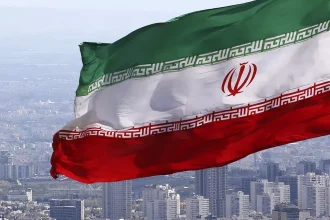The leaders of France, Germany, Britain, and Poland arrived in Kyiv on Saturday for high-level talks with Ukrainian President Volodymyr Zelensky, vowing to intensify pressure on Russia until it agrees to a ceasefire — just a day after a show of military strength by President Vladimir Putin in Moscow.
French President Emmanuel Macron, newly sworn-in German Chancellor Friedrich Merz, and British Prime Minister Keir Starmer travelled together by train from neighbouring Poland. They were later joined in the Ukrainian capital by Polish Prime Minister Donald Tusk. It marked the first joint visit to Ukraine by the leaders of all four European powers since Russia launched its full-scale invasion more than three years ago.
The visit, a symbolic show of solidarity, came just 24 hours after Putin presided over a parade on Red Square to mark 80 years since the end of World War II — an event that featured a defiant speech and high-profile guests, including Chinese President Xi Jinping and Slovak Prime Minister Robert Fico.
Ahead of their arrival in Kyiv, the European leaders issued a joint statement aligning with a recent proposal by United States President Donald Trump, calling for an immediate truce.
“Alongside the US, we call on Russia to agree a full and unconditional 30-day ceasefire to create the space for talks on a just and lasting peace,” the leaders declared.
“We are ready to support peace talks as soon as possible, to discuss technical implementation of the ceasefire, and prepare for a full peace deal,” the statement added.
“We are clear the bloodshed must end, Russia must stop its illegal invasion, and Ukraine must be able to prosper as a safe, secure and sovereign nation within its internationally recognised borders for generations to come.”
They also vowed to increase support for Kyiv until Russia halts its aggression. “We will continue to increase our support for Ukraine. Until Russia agrees to an enduring ceasefire, we will ratchet up pressure on Russia’s war machine,” they said.
During the visit — Merz’s first since becoming chancellor — the leaders were scheduled to hold both in-person and virtual meetings with Zelensky. The agenda included discussions on plans to build a European force that would help guarantee Ukraine’s post-war security and assist in the regeneration of its armed forces.
The statement said such a force “would help regenerate Ukraine’s armed forces after any peace deal and strengthen confidence in any future peace.”
While showing firm unity, the leaders reiterated their support for a peaceful resolution: “We, the leaders of France, Germany, Poland and the United Kingdom will stand in Kyiv in solidarity with Ukraine against Russia’s barbaric and illegal full-scale invasion,” the statement read.
“We reiterate our backing for President Trump’s calls for a peace deal and call on Russia to stop obstructing efforts to secure an enduring peace.”
However, hopes for an immediate breakthrough appeared dim. Kremlin spokesperson Dmitry Peskov, speaking with ABC on Saturday, reiterated Russia’s precondition for a ceasefire — a halt to Western arms deliveries.
According to Peskov, without stopping the flow of weapons into Ukraine, “a truce would be an advantage for Ukraine” at a time when “Russian troops are advancing… in quite a confident way.” He added that Ukraine was “not ready for immediate negotiations.”
French President Macron, after meeting Prime Minister Tusk in Paris on Friday, called for a robust US-Europe plan to support the proposed truce, warning it must be enforced with “massive economic sanctions” if either side violates it. He also acknowledged that talks about territorial issues could be held, but only once hostilities cease.
Putin’s comments at the parade, described by Macron as “belligerent,” suggested that Moscow is not yet prepared to de-escalate. Meanwhile, Finland’s President Alexander Stubb, speaking at a separate gathering in Norway, said the US has two sanctions packages ready — targeting the banking and energy sectors — in the event diplomacy fails.
Russia currently occupies about one-fifth of Ukrainian territory and has not officially responded to mounting pressure for a ceasefire.
The timing of the visit, just four days after Merz took office, was deliberate. A senior French official, speaking anonymously, said: “It demonstrates Europe’s unity, strength, and responsiveness. And it mirrors Putin’s celebrations.”







